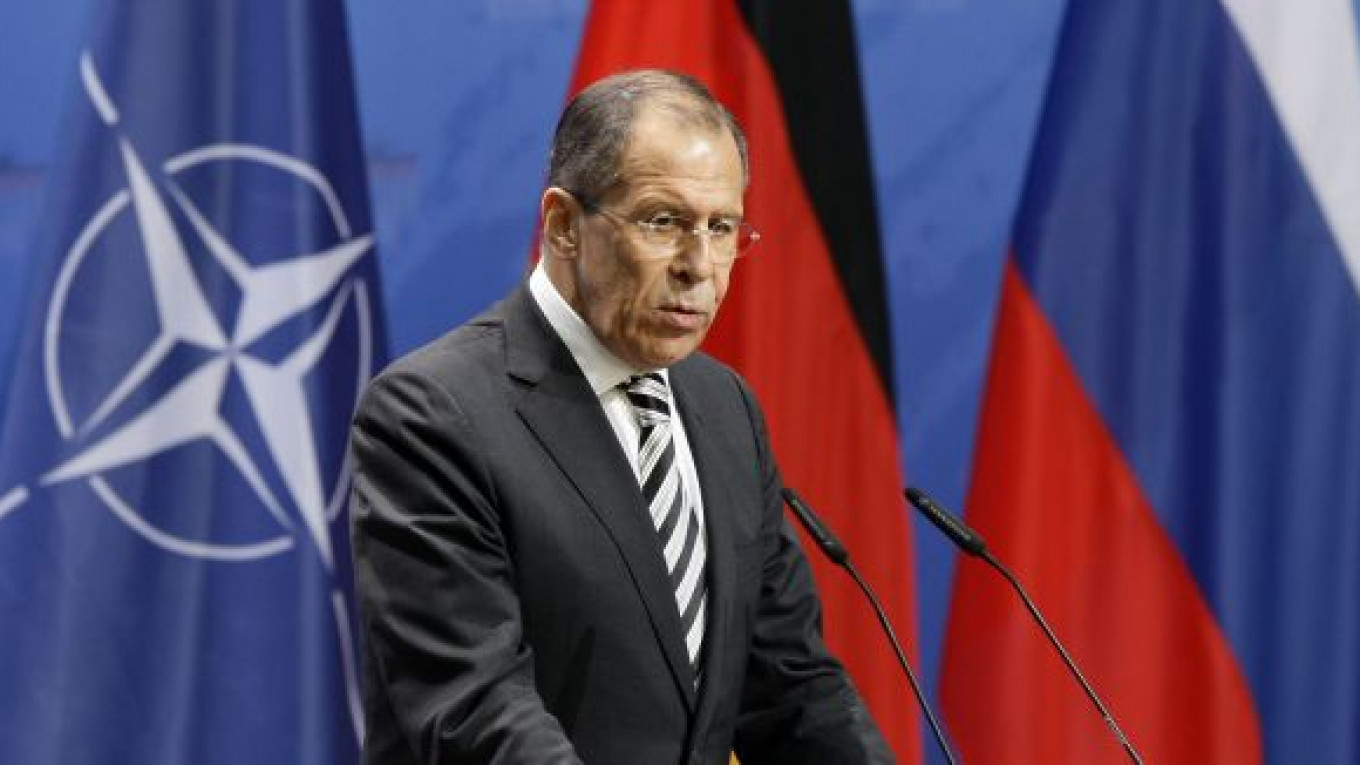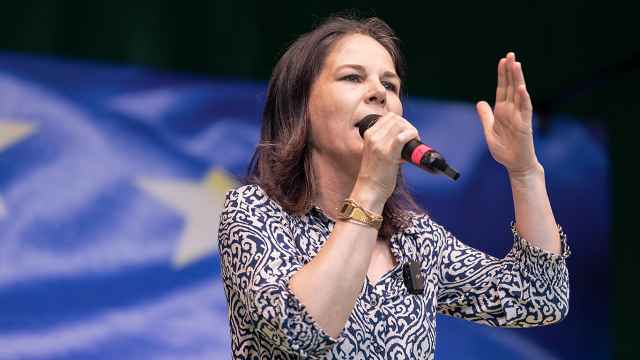BERLIN — A critical rift between NATO and Russia over a European missile shield appeared to ossify Friday, even as Foreign Minister Sergei Lavrov toned down Moscow's criticism of the alliance's military operation in Libya.
Lavrov, speaking at a news conference after a meeting of the NATO-Russia Council in Berlin, reiterated Moscow's stance that a joint missile shield should be formed to defend both NATO members and Russia from potential missile threats.
But NATO Secretary-General Anders Fogh Rasmussen made it clear that NATO sees things differently.
"We are thinking about two systems — one NATO's and one Russian — that will cooperate and exchange information to make us more secure," Fogh Rasmussen said.
He did not elaborate.
President Dmitry Medvedev urged NATO during a Lisbon summit in November to consider creating the joint system, a compromise on a shield that Washington has sought for several years to protect the United States and its NATO allies from a potential missile strike by Iran.
The initial U.S. plan — to deploy a radar station and anti-missiles near Russia's western borders — infuriated the Kremlin, which said it would tip the strategic nuclear balance away from Russia by undermining Moscow's capacity for a retaliatory nuclear strike if it was attacked first.
NATO leaders agreed in November to consider Medvedev's proposal, which would see Russia assuming responsibility for dealing with missiles flying over its territory toward NATO countries and NATO countries protecting Russia from missiles flying in its direction. A task force of Russian and NATO military experts will present a first assessment of the joint system at a meeting of NATO and Russian defense ministers in Brussels in June.
Several U.S. politicians have opposed Russia's proposal, arguing that the United States cannot entrust its security to another country, especially to a former Cold War adversary. Most recently, a group of 39 Republican senators sent a letter to U.S. President Barack Obama on Thursday, warning that cooperation on the missile shield could undermine national security and urging him not to share information about missile interceptors and data from satellites with Moscow.
Lavrov dismissed the initiative in Berlin as a populist stunt.
A NATO diplomat, speaking on condition of anonymity because of the sensitivity of the issue, said consultations over the joint system were progressing with difficulty because of a lack of trust between parties. "When we ask the Russians what they can contribute to the possible future shield, they don't talk," he said.
Moreover, Russia lacks the capacity to intercept ballistic missiles in the design of the missile shield envisioned by Medvedev, said Russia's leading specialist on nuclear security, Vladimir Yevseyev of the Center for Social and Political Studies.
Development of the S-500 advanced anti-aircraft system capable of destroying ballistic long-range missiles is expected to be completed only in 2015, according to Defense Ministry officials. The S-400 systems that are in service can only intercept short- and mid-range missiles.
The NATO diplomat said even if Russian and NATO experts fail to reach common ground by June, they will have at least one more year to continue consultations.
Medvedev and Prime Minister Vladimir Putin have threatened a new arms race and to position tactical missile systems targeted against Europe on Russia's western borders if Moscow's interests are ignored in the creation of the missile shield in Europe.
Still, Lavrov did not push hard on this issue Friday, saying only that his meeting with NATO foreign ministers aimed to give the experts a push in their consultations.
Lavrov also stepped back from Russian leaders' criticism of NATO's dealings in Libya, where the alliance has United Nations' approval to intervene to prevent human rights abuses perpetrated by forces loyal to Libyan leader Moammar Gadhafi.
Putin condemned NATO's military intervention in Libya as a "medieval crusade" last month, even though Russia abstained from the UN Security Council vote that endorsed the intervention. Medvedev, who rebuked Putin for his remarks, said Thursday that the actions of some countries go beyond the UN mandate in Libya.
Asked by journalists how Russia would react to allegations that some NATO countries were seeking to provide arms to anti-Gadhafi forces, Lavrov replied mildly that responsibility lay with the UN Security Council, not Russia, to act as a watchdog in such situations. He also said Fogh Rasmussen made the "right noises" during talks about the Libyan crisis.
Lavrov added, however, that Russia does not support a policy of threatening Libya with ultimatums and prefers negotiations. On Thursday, Obama, French President Nicolas Sarkozy and British Prime Minister David Cameron pledged to fight in Libya until Gadhafi left power.
"The Security Council has not sanctioned a regime change in Libya," Lavrov said.
Also Friday, Russia and NATO agreed to set up a so-called Afghan helicopter trust fund that will train Afghans to maintain and repair Soviet- and Russian-made helicopters used by the Afghan air force. Lavrov said Russia would contribute to the fund by providing educational and training facilities.
Russia has already contributed to the anti-Taliban effort in Afghanistan by allowing the transit of civilian and military cargoes over its territory and by training Afghan anti-narcotics officers.
A Message from The Moscow Times:
Dear readers,
We are facing unprecedented challenges. Russia's Prosecutor General's Office has designated The Moscow Times as an "undesirable" organization, criminalizing our work and putting our staff at risk of prosecution. This follows our earlier unjust labeling as a "foreign agent."
These actions are direct attempts to silence independent journalism in Russia. The authorities claim our work "discredits the decisions of the Russian leadership." We see things differently: we strive to provide accurate, unbiased reporting on Russia.
We, the journalists of The Moscow Times, refuse to be silenced. But to continue our work, we need your help.
Your support, no matter how small, makes a world of difference. If you can, please support us monthly starting from just $2. It's quick to set up, and every contribution makes a significant impact.
By supporting The Moscow Times, you're defending open, independent journalism in the face of repression. Thank you for standing with us.
Remind me later.







